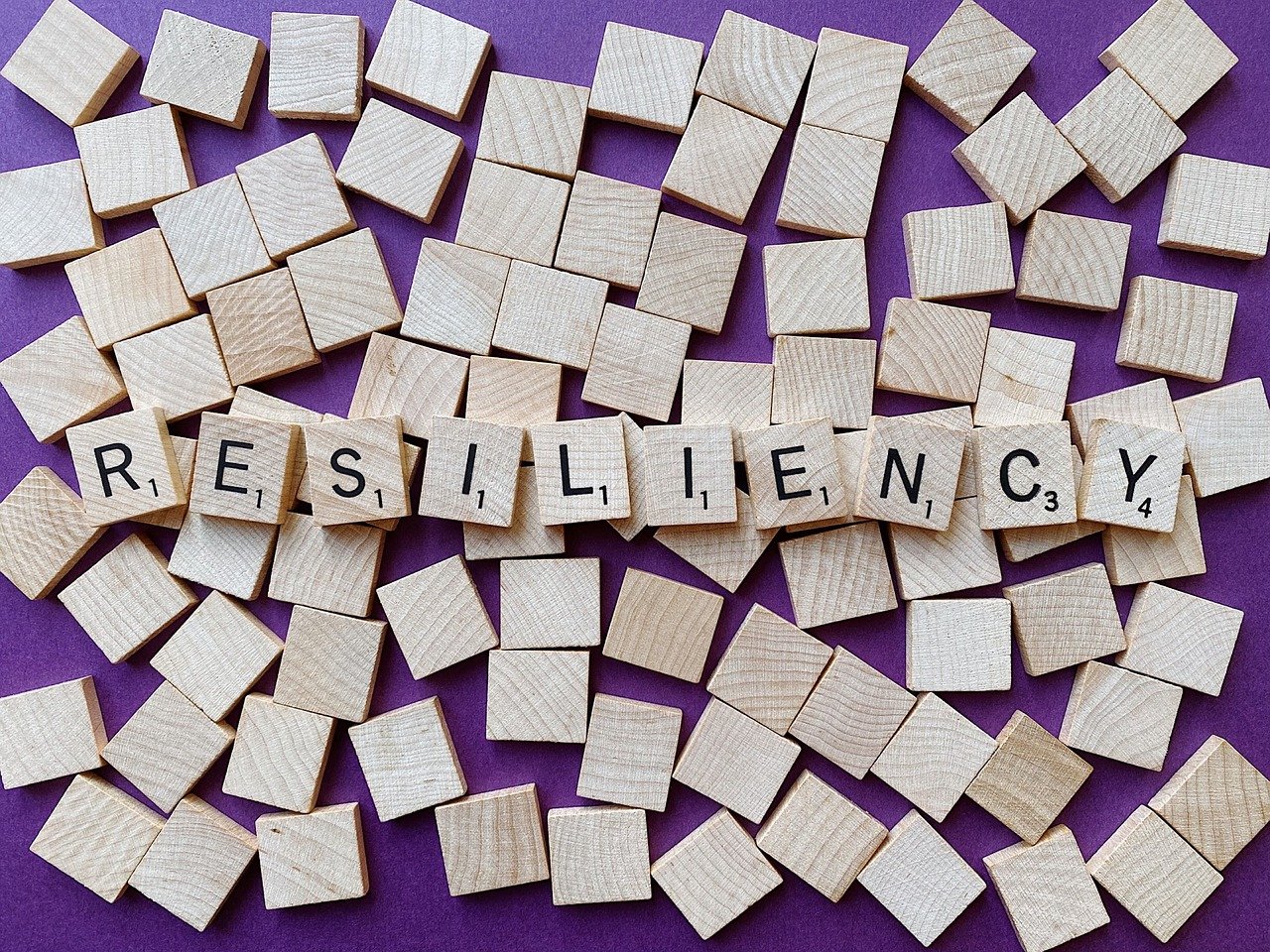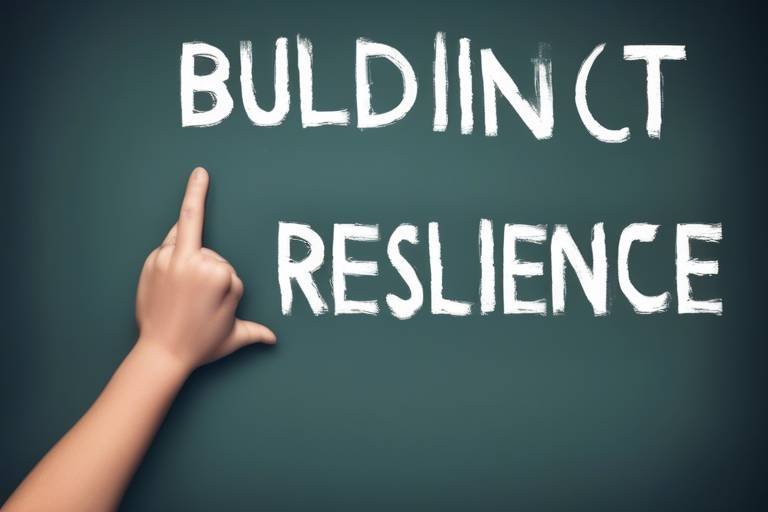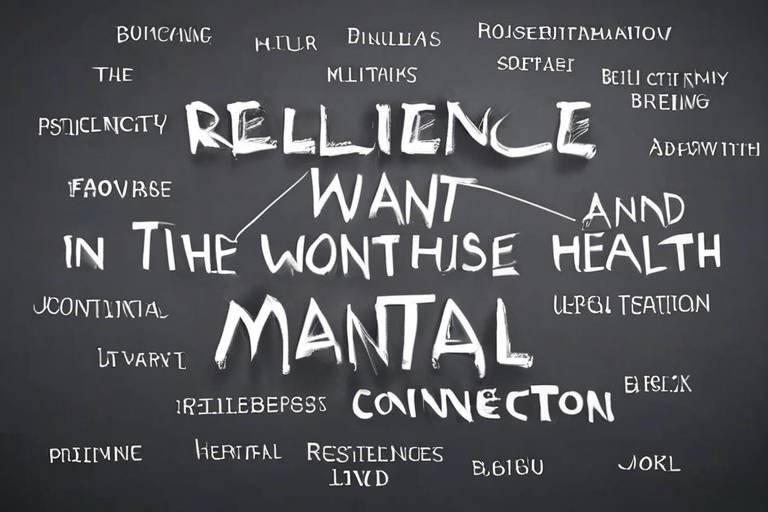Building Resilience - The Power of Positive Focus
In a world that often feels like a whirlwind of challenges and uncertainties, the ability to bounce back and thrive is more crucial than ever. Resilience is not just a buzzword; it’s a vital skill that empowers individuals to navigate life's ups and downs with grace and strength. Imagine resilience as a rubber band—it stretches and bends but never breaks. This article explores the significance of resilience and how maintaining a positive focus can be the key to overcoming obstacles and flourishing in adversity.
Resilience is the ability to recover from setbacks, adapt well to change, and keep going in the face of adversity. In today’s fast-paced world, where stress and uncertainty lurk around every corner, resilience is essential for personal growth and emotional well-being. Think of it as your mental armor; it helps you withstand life’s storms. Without resilience, setbacks can feel overwhelming, leading to feelings of hopelessness and despair. However, with a resilient mindset, challenges become opportunities for learning and growth.
So, what exactly is positive focus? It’s all about concentrating on constructive thoughts and outcomes rather than dwelling on negativity. Picture your mind as a garden; if you plant seeds of positivity, you’ll cultivate a flourishing landscape of hope and motivation. Positive focus is not about ignoring the reality of challenges; it’s about choosing to view them through a lens of possibility and strength. This shift in perspective plays a pivotal role in enhancing resilience, enabling individuals to tackle difficulties with a more optimistic outlook.
Developing a positive focus doesn’t happen overnight; it requires intentional effort and practice. Here are some practical strategies to help you cultivate and maintain a positive mindset:
- Mindfulness: Being present and aware can significantly enhance your ability to focus on the positive. Mindfulness practices, such as meditation or deep breathing, allow you to ground yourself in the moment, reducing stress and increasing clarity.
- Gratitude Practices: Taking time to acknowledge what you’re thankful for can shift your perspective. Keeping a gratitude journal or simply reflecting on positive experiences can enhance emotional strength.
- Reframing Negative Thoughts: Challenge negative thoughts by questioning their validity. This practice helps to foster a more constructive outlook on life.
Mindfulness involves being fully present and aware of your thoughts and feelings without judgment. It’s like taking a mental vacation from the chaos of life. Techniques such as meditation, yoga, and even mindful walking can help you cultivate a positive mindset. By focusing on your breath or the sensations of your body, you create a space where positive thoughts can flourish, ultimately improving your resilience.
Practicing gratitude is like flipping a switch that illuminates the positives in your life. Regularly acknowledging what you appreciate can enhance your emotional strength over time. Whether it’s jotting down three things you’re grateful for each day or sharing your appreciation with others, these small acts can lead to a profound shift in your outlook. Gratitude helps to anchor you amidst the storm, reminding you of the good that exists even in tough times.
Negative thoughts can be like weeds in your mental garden, choking out the beautiful blooms of positivity. It’s crucial to identify and challenge these thoughts to foster a more optimistic outlook. Start by recognizing when you’re feeling down and ask yourself: Is this thought true? or What evidence do I have to support this? By questioning the validity of negative thoughts, you can uproot them and replace them with more constructive ones, paving the way for resilience.
Support systems are like the scaffolding that holds you up when life gets tough. They play a crucial role in building resilience, providing emotional backing and practical assistance. Whether it’s family, friends, or community, having a solid support network can significantly enhance your capacity to cope with challenges. It’s essential to nurture these relationships, as they can be the lifeline that helps you weather any storm.
Strong relationships provide emotional support and a sense of belonging, which are vital for resilience. Investing time in nurturing connections with family, friends, and colleagues can create a safety net that catches you when you fall. These relationships foster a sense of community and shared experience, reminding you that you’re not alone in your struggles.
Engaging with your community can also bolster resilience. Participating in community activities not only provides support but also fosters a sense of belonging and purpose. Whether it’s volunteering, joining a club, or attending local events, being active in your community can enhance your emotional well-being and resilience, creating a network of support that uplifts you.
1. What is resilience?
Resilience is the ability to bounce back from setbacks and adapt well to change. It’s a crucial skill that enables individuals to cope with challenges effectively.
2. How can I develop a positive focus?
You can develop a positive focus by practicing mindfulness, expressing gratitude, and reframing negative thoughts into constructive ones.
3. Why are support systems important for resilience?
Support systems provide emotional backing and practical assistance, helping individuals cope with challenges and fostering a sense of belonging.
4. What are some mindfulness techniques?
Mindfulness techniques include meditation, deep breathing exercises, and mindful walking, all of which help you stay present and focused.
5. How can gratitude practices enhance resilience?
Gratitude practices shift your perspective, helping you focus on the positives in life and reinforcing emotional strength over time.

The Importance of Resilience
This article explores the importance of resilience and how maintaining a positive focus can empower individuals to overcome challenges and thrive in adversity.
Resilience is more than just a buzzword; it's a crucial life skill that enables individuals to navigate the ups and downs of life. In a world that often feels chaotic and unpredictable, being resilient allows you to bounce back from setbacks, adapt to change, and keep moving forward despite obstacles. Think of resilience as your emotional rubber band; the more you stretch it, the more it can rebound to its original shape. This ability to recover is essential for personal growth and emotional well-being, especially in today’s fast-paced society.
Why is resilience so vital? For starters, it acts as a buffer against stress. When faced with challenges—be it personal issues, work-related stress, or unexpected crises—resilience helps you maintain a sense of balance. It's like having a sturdy umbrella on a rainy day; it won’t stop the rain, but it will keep you dry and comfortable as you navigate through it. Resilient individuals often report higher levels of happiness and satisfaction in life, as they are better equipped to handle adversity.
Moreover, resilience fosters a growth mindset. When you face difficulties with a resilient attitude, you are more likely to view challenges as opportunities for learning and development. This shift in perspective can lead to greater achievements and a more fulfilling life. In essence, resilience is not just about enduring hardships; it’s about thriving in the face of them.
To further illustrate the significance of resilience, consider the following key points:
- Enhanced Coping Skills: Resilient individuals develop effective coping strategies that help them deal with stress and adversity.
- Improved Emotional Regulation: Resilience allows for better control over emotions, reducing feelings of anxiety and depression.
- Stronger Relationships: Resilient people often have healthier relationships, as they can communicate effectively and support others in times of need.
- Increased Adaptability: Resilience fosters the ability to adapt to change, making it easier to navigate life’s twists and turns.
In conclusion, the importance of resilience cannot be overstated. It empowers individuals to face life's challenges head-on, enabling them to not only survive but thrive. As we delve deeper into the concept of resilience, we will explore how maintaining a positive focus can further enhance this invaluable trait.
Q: What is resilience?
A: Resilience is the ability to recover from setbacks and adapt to change effectively.
Q: Why is resilience important?
A: It helps individuals cope with stress, enhances emotional well-being, and fosters personal growth.
Q: How can I build resilience?
A: Building resilience involves developing coping strategies, maintaining a positive focus, and nurturing strong relationships.

Understanding Positive Focus
In a world that often feels chaotic and unpredictable, positive focus emerges as a beacon of hope and strength. It’s not just about wearing rose-colored glasses or ignoring the harsh realities of life; rather, it involves intentionally directing our thoughts toward constructive and uplifting outcomes. Imagine your mind as a garden—what you choose to plant and nurture will ultimately shape the landscape of your emotional well-being. By cultivating a positive focus, you can transform that garden into a vibrant space where resilience thrives.
So, what does it really mean to have a positive focus? It’s about more than just fleeting moments of happiness. It’s a mindset that encourages you to see challenges as opportunities for growth. When faced with obstacles, instead of spiraling into negativity, a positive focus allows you to ask yourself empowering questions such as, “What can I learn from this?” or “How can this situation help me grow?” This shift in perspective is crucial for building resilience, as it equips you with the tools to navigate life’s ups and downs.
Research shows that maintaining a positive focus can lead to improved mental health, greater life satisfaction, and increased resilience. It’s like having an internal compass that guides you through storms. Here are some key elements that define positive focus:
- Constructive Thinking: This involves reframing negative thoughts into constructive ones. Instead of thinking, “I can’t handle this,” you might say, “This is tough, but I have overcome challenges before.”
- Future-Oriented Mindset: Positive focus encourages you to look ahead. Visualizing a positive outcome can motivate you to take actionable steps toward your goals.
- Emotional Regulation: By focusing on the positive, you learn to manage your emotions better, reducing feelings of anxiety and stress.
To illustrate the impact of positive focus, consider a simple table that outlines the differences between a negative and a positive mindset:
| Aspect | Negative Mindset | Positive Mindset |
|---|---|---|
| Response to Challenges | Feeling overwhelmed and defeated | Seeing challenges as opportunities for growth |
| Self-Talk | “I can’t do this.” | “I will figure this out.” |
| Emotional State | Increased anxiety and stress | Calmness and clarity |
By focusing on the positive, you not only enhance your resilience but also create a ripple effect that can influence those around you. When you embody a positive focus, you inspire friends, family, and colleagues to adopt a similar mindset. It’s like lighting a candle in a dark room; your positivity can illuminate the path for others, fostering a supportive environment where everyone can thrive.
In summary, understanding positive focus is about recognizing its profound impact on resilience and emotional health. It’s not just a fleeting feeling; it’s a powerful tool that can help you navigate life’s challenges with grace and strength. So, the next time you find yourself facing a tough situation, remember to pause, breathe, and shift your focus toward the positive. After all, the power to transform your mindset is always within your reach.

Strategies for Cultivating Positive Focus
In a world swirling with chaos and uncertainty, cultivating a positive focus can feel like trying to catch smoke with your bare hands. Yet, it’s not just a whimsical notion; it’s a powerful strategy that can transform our lives. So, how do we harness this elusive positivity? Here are some practical strategies that can help you steer your thoughts towards the brighter side of life.
First off, let’s dive into the realm of mindfulness. Mindfulness is all about being present in the moment, fully aware of your thoughts and feelings without judgment. It’s like taking a step back and observing your life as if you’re watching a movie. By practicing mindfulness, you can become more aware of negative thought patterns that creep in and derail your positive focus. Techniques such as deep breathing, meditation, and even mindful walking can anchor you to the present, allowing you to appreciate the little things that often go unnoticed. Imagine sipping your morning coffee and truly savoring each sip instead of scrolling through your phone. That’s mindfulness in action!
Another effective strategy is to embrace gratitude practices. Have you ever noticed how easy it is to focus on what’s going wrong? It’s like a magnet pulling your attention away from the good stuff. By consciously practicing gratitude, you can flip that script. Start a daily gratitude journal where you jot down three things you’re thankful for each day. This simple act can shift your perspective dramatically. Over time, you’ll find that your mind naturally gravitates towards positivity, making it easier to face challenges with a resilient heart.
Additionally, reframing negative thoughts can be a game changer. Instead of viewing a setback as a failure, try to see it as an opportunity for growth. For instance, if you didn’t get that job you applied for, instead of drowning in disappointment, ask yourself what you can learn from the experience. This shift in perspective can empower you to take control of your narrative, transforming obstacles into stepping stones.
Lastly, surrounding yourself with positive influences can significantly enhance your ability to maintain a positive focus. Engage with people who uplift you, share inspiring stories, and encourage growth. Consider joining a community group or participating in activities that align with your interests. Surrounding yourself with positivity can create an environment where your own positive focus can flourish.
In summary, cultivating a positive focus involves a combination of mindfulness, gratitude, reframing negative thoughts, and surrounding yourself with positivity. By integrating these strategies into your daily routine, you can build a resilient mindset that not only helps you cope with challenges but also allows you to thrive in adversity.
- What is the best way to start practicing mindfulness? Begin with just a few minutes of focused breathing each day. Gradually increase the duration as you become more comfortable.
- How can I remember to practice gratitude daily? Set a reminder on your phone or keep your gratitude journal by your bedside to jot down your thoughts before sleeping.
- What if I struggle to reframe negative thoughts? Consider speaking with a therapist or counselor who can help guide you through the process of cognitive reframing.

Mindfulness Techniques
When it comes to building resilience, can be a game changer. Imagine standing in the middle of a bustling city, surrounded by noise and chaos, yet feeling a profound sense of calm. That’s the essence of mindfulness. It’s about being present in the moment and fully engaging with your thoughts and feelings without judgment. By practicing mindfulness, you can train your brain to focus on the here and now, allowing you to better navigate life’s ups and downs.
One effective mindfulness technique is breathing exercises. These exercises are simple yet powerful. For instance, try the 4-7-8 technique: inhale deeply through your nose for a count of four, hold your breath for seven counts, and then exhale slowly through your mouth for eight counts. This practice not only calms your mind but also reduces anxiety, helping you to approach challenges with a clearer perspective.
Another technique to consider is body scanning. This practice involves focusing your attention on different parts of your body, starting from your toes and moving upward. As you mentally scan each area, notice any tension or discomfort and consciously relax those muscles. This method not only enhances your body awareness but also fosters a deeper connection between your mind and body, which is crucial for resilience.
Additionally, mindful meditation can serve as a powerful tool for cultivating resilience. Set aside a few minutes each day to sit quietly and focus on your breath. If your mind wanders, gently bring your focus back to your breathing. Over time, this practice can help you develop a greater sense of control over your thoughts, enabling you to respond to stressors more effectively.
Finally, incorporating mindfulness into daily activities can significantly enhance your overall resilience. Whether you’re eating, walking, or even washing dishes, try to engage fully in the experience. Notice the flavors of your food, the sensations of your feet touching the ground, or the warmth of the water on your hands. By bringing mindfulness into the mundane, you can transform everyday moments into opportunities for growth and strength.
In summary, mindfulness techniques are not just practices but pathways to resilience. By embracing these techniques, you can cultivate a positive mindset that empowers you to face life’s challenges head-on. Remember, resilience is not about avoiding difficulties but about learning to thrive despite them.
- What is mindfulness?
Mindfulness is the practice of being fully present and engaged in the moment, allowing you to observe your thoughts and feelings without judgment. - How can mindfulness improve resilience?
By promoting a calm and focused mind, mindfulness helps you respond to stress more effectively, enhancing your ability to bounce back from setbacks. - How often should I practice mindfulness?
Even a few minutes of daily practice can be beneficial. The key is consistency; try to incorporate mindfulness into your routine.

Gratitude Practices
Practicing gratitude is like planting seeds in your garden of positivity; the more you nurture them, the more vibrant and resilient your mental landscape becomes. When we consciously take a moment to appreciate the little things in life, we shift our focus from what’s lacking to what’s abundant. This simple yet powerful practice can significantly enhance our emotional strength and resilience over time. Imagine waking up each day and starting with a mental checklist of things you’re grateful for—this sets a positive tone that can carry you through even the most challenging situations.
One effective way to cultivate gratitude is through a daily journaling practice. By dedicating a few minutes each day to jot down three to five things you are thankful for, you create a tangible reminder of the good in your life. This could be as simple as appreciating a warm cup of coffee in the morning or the smile of a loved one. Over time, this practice can rewire your brain to focus on positivity, making it easier to bounce back from setbacks. Studies have shown that individuals who regularly engage in gratitude journaling report higher levels of happiness and lower levels of depression.
Another powerful gratitude practice is to express your appreciation directly to those around you. Whether it’s writing a heartfelt note to a friend or simply telling someone how much they mean to you, these acts of kindness not only uplift the recipient but also boost your own mood. It’s like a double whammy of joy! You’re not just acknowledging the good in your life; you’re also fostering deeper connections with others, which is crucial for building resilience.
Additionally, integrating gratitude into your daily routine can be incredibly beneficial. For instance, you might choose to reflect on what you’re grateful for during your morning commute or right before bed. This could involve a mental recap of your day, focusing on positive interactions or accomplishments, no matter how small. By making gratitude a habit, you create a mental buffer against the inevitable stresses of life, making it easier to handle challenges when they arise.
In summary, gratitude practices are not just feel-good exercises; they are essential tools for enhancing resilience. By focusing on the positives, expressing appreciation, and integrating gratitude into your daily life, you create a robust framework that supports your emotional well-being. Remember, the more you practice gratitude, the more resilient you become, turning life’s challenges into stepping stones rather than stumbling blocks.
- What are some simple ways to practice gratitude? You can start by keeping a gratitude journal, expressing thanks to others, or reflecting on positive experiences daily.
- How does gratitude improve resilience? Gratitude helps shift focus from negative to positive, fostering a mindset that is better equipped to handle stress and adversity.
- Can gratitude practices be done alone? Absolutely! While sharing gratitude with others is beneficial, personal reflection and journaling can be equally powerful.

Overcoming Negative Thoughts
Negative thoughts can feel like a heavy fog, obscuring our vision and clouding our judgment. They creep in when we least expect it, whispering doubts and fears that can derail our progress and sap our energy. But here’s the good news: just as a fog can lift, so too can we learn to overcome these pesky thoughts. The key lies in recognizing them and taking proactive steps to challenge and change them. It’s like being a gardener, pulling out the weeds of negativity to allow the flowers of positivity to bloom.
First, it’s important to identify when negative thoughts are creeping in. This requires a bit of self-awareness, almost like tuning into a radio station. Are you constantly thinking, “I can’t do this,” or “I’m not good enough”? These thoughts are red flags. Once you notice them, you can begin to challenge their validity. Ask yourself, “Is this thought based on facts or just my own fears?” Often, you’ll find that these negative thoughts are exaggerated or completely unfounded, much like a shadow that appears larger than it is in the dark.
One effective technique for overcoming negative thoughts is cognitive restructuring. This is a fancy term for changing the way you think. You can start by writing down your negative thoughts and then countering them with more realistic, positive alternatives. For example, if you catch yourself thinking, “I’ll never succeed,” you can reframe it to, “I have faced challenges before and succeeded; I can do it again.” This practice not only helps in shifting your mindset but also reinforces your belief in your abilities.
Another powerful method is to practice mindfulness meditation. This involves sitting quietly and paying attention to your thoughts without judgment. It’s like watching clouds float by in the sky; you notice them but don’t let them affect you. Over time, this practice can help you develop a greater awareness of your thought patterns and allow you to let go of negative ones more easily.
Additionally, surrounding yourself with positive influences can make a significant difference. Engage with people who uplift you and encourage a positive outlook. Their energy can be contagious, helping to drown out the negativity that sometimes clings to us. It’s like being part of a supportive team where everyone cheers each other on. Remember, you don’t have to go through this alone!
Lastly, consider keeping a gratitude journal. Each day, jot down three things you’re grateful for. This simple practice can shift your focus from what’s wrong in your life to what’s going well. Over time, this can create a positive feedback loop, helping to diminish the power of negative thoughts. Think of it as training your brain to seek out the good, much like a treasure hunt where you discover gems of positivity hidden amidst the mundane.
In summary, overcoming negative thoughts is not just about silencing them; it’s about transforming your relationship with them. By recognizing, challenging, and reframing these thoughts, you can cultivate a more positive mindset. It takes practice and patience, but just like building a muscle, the more you work at it, the stronger you’ll become. So, let’s roll up our sleeves and start digging out those weeds!
- What are negative thoughts? Negative thoughts are pessimistic or self-defeating thoughts that can hinder your ability to cope with challenges.
- How can I identify my negative thoughts? Pay attention to patterns in your thinking, especially during stressful times. Journaling can help you recognize these thoughts.
- What is cognitive restructuring? It is a technique used to challenge and change negative thought patterns into more positive and realistic ones.
- How does mindfulness help with negative thoughts? Mindfulness allows you to observe your thoughts without judgment, helping you detach from negativity.
- Can gratitude really change my mindset? Yes! Regularly practicing gratitude shifts your focus from what’s lacking to appreciating what you have, fostering a positive outlook.

The Role of Support Systems
When we think about resilience, it’s easy to imagine a lone warrior bravely facing life's challenges. However, the truth is that support systems are often the unsung heroes in our journey toward resilience. These systems can take various forms, including family, friends, colleagues, and even community networks. They provide a safety net, a listening ear, and a source of encouragement that can make all the difference when the going gets tough. Have you ever noticed how just a simple conversation with a friend can lift your spirits? That’s the power of connection!
Support systems not only help us cope with stress but also enhance our emotional well-being. They act as a buffer against the negative effects of stress and adversity, allowing us to bounce back more effectively. Imagine trying to climb a steep mountain alone—it's daunting and exhausting. Now, picture having a group of friends by your side, cheering you on and offering their hands when you stumble. That’s what a robust support system does; it transforms the uphill battle into a shared journey.
Research has shown that individuals with strong support systems are more likely to exhibit resilience in the face of challenges. They tend to recover quicker from setbacks and maintain a more positive outlook on life. This is because the emotional support received from others can help us reframe our thoughts and see setbacks as temporary hurdles rather than insurmountable obstacles. For instance, when you share your struggles with a friend, they might provide insights or perspectives you hadn’t considered, helping you to shift your mindset.
Moreover, the role of community engagement cannot be overstated. Being part of a community not only provides emotional support but also fosters a sense of belonging. Whether it’s participating in local events, volunteering, or joining clubs, engaging with others can create a network of support that enhances resilience. It’s like being part of a team where everyone has each other’s back. When you see others facing challenges and overcoming them, it inspires you to do the same.
To highlight the importance of support systems, let’s consider a few key benefits:
| Benefit | Description |
|---|---|
| Emotional Support | Having someone to talk to can alleviate feelings of isolation and loneliness. |
| Practical Assistance | Support systems can provide help in practical ways, such as childcare or running errands. |
| Shared Experiences | Connecting with others who have faced similar challenges can be empowering. |
In conclusion, while resilience is often portrayed as an individual trait, it is significantly bolstered by the support systems we cultivate. Whether it’s through family, friends, or community, these connections provide the emotional and practical support necessary to navigate life's challenges. So, the next time you face a hurdle, remember that you don’t have to go it alone. Reach out, connect, and let your support system help you rise above!

Building Strong Relationships
Building strong relationships is like nurturing a garden; it requires time, effort, and the right conditions to flourish. When we talk about resilience, we can’t overlook the **crucial role** that relationships play in our lives. Think about it: have you ever faced a tough situation and found solace in a friend’s comforting words or a family member’s reassuring presence? Those moments remind us that we are not alone, and that support can significantly bolster our ability to bounce back from adversity.
Strong relationships provide a safety net during life’s storms. They offer emotional support, which is essential for mental well-being. When we know we have someone to lean on, it gives us the courage to face challenges head-on. This network of support can come from various sources, including family, friends, colleagues, and even community members. Each relationship contributes uniquely to our resilience, but nurturing these connections is key.
To foster strong relationships, consider the following strategies:
- Communication: Open and honest communication is the foundation of any relationship. Share your thoughts and feelings, and encourage others to do the same.
- Quality Time: Spend quality time together, whether it’s through shared activities or simple conversations. This strengthens bonds and creates lasting memories.
- Support: Be there for others during their tough times. Offering support not only helps them but also reinforces your connection.
Moreover, it’s essential to recognize that relationships are a two-way street. Just as you seek support, be willing to provide it. This reciprocal nature helps build trust and deepens connections. In essence, the more you invest in your relationships, the more resilient you become.
Another aspect to consider is the diversity of your support system. Engaging with a variety of people enriches your life and provides different perspectives. For example, friends from different backgrounds can offer unique insights that might help you see challenges in a new light. This diversity can be a powerful tool for resilience, as it broadens your understanding and equips you with varied strategies to tackle difficulties.
In addition to personal relationships, community engagement is equally vital. Participating in community activities not only strengthens your ties with others but also fosters a sense of belonging. Whether it’s volunteering, joining clubs, or attending local events, being active in your community can create a support network that enhances your resilience. Remember, you are part of a larger tapestry, and every thread contributes to your strength.
In conclusion, building strong relationships is an essential component of resilience. By nurturing connections, communicating openly, and engaging with your community, you create a robust support system that can help you navigate life’s challenges. So, take a moment to reach out to someone today; you never know how a simple gesture can uplift both your spirits and theirs.
Q1: How can I improve my communication skills in relationships?
A1: Start by practicing active listening. Focus on what the other person is saying without planning your response while they speak. Additionally, express your thoughts clearly and respectfully.
Q2: What if I feel overwhelmed by my relationships?
A2: It's important to set boundaries. Communicate your needs to your loved ones and prioritize self-care. Sometimes, taking a step back can help you recharge and approach relationships with a fresh perspective.
Q3: How can I find community activities to join?
A3: Look for local community centers, libraries, or online platforms that list events and activities. Social media groups can also be a great resource to discover opportunities to engage with your community.

Community Engagement
Engaging with your community is like planting seeds in a garden; the more you nurture those connections, the more vibrant and supportive your surroundings become. Community engagement is not just about attending events or volunteering; it's about fostering relationships that can uplift and empower you during tough times. When you immerse yourself in community activities, you create a network of support that can significantly enhance your resilience. Imagine facing a storm with a solid umbrella—your community acts as that protective shield, helping you weather life's challenges.
One of the most profound benefits of community engagement is the sense of belonging it fosters. When you participate in local events or volunteer for causes you care about, you create bonds with like-minded individuals. These relationships can provide emotional support, encouragement, and a sense of purpose. Whether it's joining a book club, participating in a neighborhood clean-up, or volunteering at a local shelter, each interaction reinforces the idea that you are not alone in your struggles.
Moreover, community engagement can lead to personal growth. By stepping outside of your comfort zone and meeting new people, you expose yourself to different perspectives and experiences. This diversity can enrich your understanding of the world and enhance your ability to cope with adversity. Think of it as a tapestry woven from various threads; each thread represents a unique experience that contributes to the overall strength and beauty of the fabric.
To illustrate the impact of community engagement, consider the following table that highlights various ways to get involved and their corresponding benefits:
| Type of Engagement | Benefits |
|---|---|
| Volunteering | Builds skills, enhances empathy, and creates meaningful connections. |
| Joining Local Clubs | Provides social support, fosters friendships, and encourages teamwork. |
| Participating in Community Events | Strengthens community ties and promotes a sense of belonging. |
| Engaging in Local Decision-Making | Empowers individuals and encourages civic responsibility. |
In conclusion, engaging with your community is a powerful strategy for building resilience. It not only provides a support network but also enriches your life with new experiences and perspectives. So, why not take that first step today? Attend a local event, volunteer for a cause you believe in, or simply reach out to a neighbor. The connections you create can be the foundation of your resilience, helping you to thrive even in the face of adversity.
Q: How can I start getting involved in my community?
A: You can start by looking for local volunteer opportunities, attending community events, or joining clubs that align with your interests. Websites like VolunteerMatch can help you find opportunities near you.
Q: What if I’m shy or introverted?
A: It’s completely normal to feel shy! Start small by attending events with a friend or participating in online community groups where you can gradually build your confidence.
Q: Are there benefits to community engagement for mental health?
A: Absolutely! Engaging with your community can reduce feelings of isolation, increase feelings of belonging, and provide emotional support, all of which are beneficial for mental health.
Frequently Asked Questions
- What is resilience and why is it important?
Resilience is the ability to bounce back from setbacks and challenges. It's like a rubber band that stretches but doesn't break. In our fast-paced world, having resilience is essential for personal growth and emotional well-being, helping us navigate life's ups and downs with a positive attitude.
- How can I develop a positive focus?
Developing a positive focus involves concentrating on constructive thoughts and outcomes. You can achieve this through mindfulness practices, gratitude exercises, and reframing negative thoughts. It's about training your mind to see the glass as half full rather than half empty!
- What are some effective mindfulness techniques?
Mindfulness techniques include deep breathing, meditation, and being present in the moment. These practices help you become more aware of your thoughts and feelings, allowing you to cultivate a positive mindset and improve your resilience over time.
- How does practicing gratitude enhance resilience?
Practicing gratitude shifts your perspective from what's lacking to what you appreciate in life. By regularly acknowledging the positives, you build emotional strength and resilience, making it easier to cope with challenges and setbacks.
- What should I do to overcome negative thoughts?
To overcome negative thoughts, start by identifying them and challenging their validity. Techniques like cognitive restructuring can help you reframe those thoughts into more positive and constructive ones, fostering a healthier outlook on life.
- How do support systems contribute to resilience?
Support systems, such as family, friends, and community, provide emotional backing during tough times. They act as a safety net, helping you cope with challenges and encouraging you to maintain a positive focus, which is crucial for building resilience.
- What are the benefits of building strong relationships?
Strong relationships offer emotional support and a sense of belonging. They can boost your resilience by providing comfort during difficult times, sharing experiences, and encouraging you to stay positive and focused on constructive outcomes.
- How can community engagement enhance resilience?
Engaging with your community fosters a sense of belonging and support. Participating in community activities not only strengthens social connections but also provides opportunities to share experiences and resources, which can significantly enhance your resilience.


















